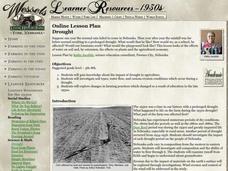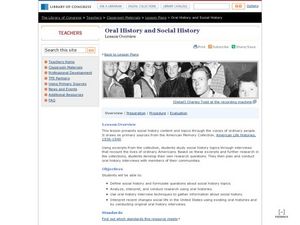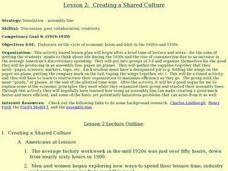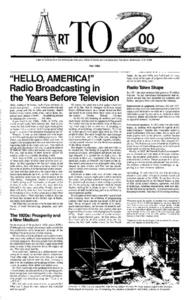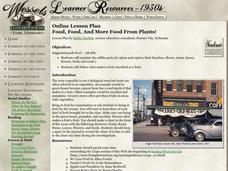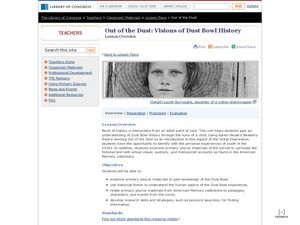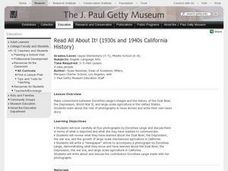Curated OER
When Were Houses in our Locality Built?
Take a look at the types of houses to determine when they may have been built. This UK-based slide-show shows houses common to Great Britain such as, Tudor, Victorian, 1930's, and Modern styles. This could be used as a compare and...
K12 Reader
The Great Depression
Try out this reading passage when teaching your class about the 1920s and 1930s. After reading the text, which provides an overview of some major events in these years, learners respond to five related questions.
Curated OER
On The Causes of The Dust Bowl
Here's a new twist on the causes and focus of the 1930s Dust Bowl. Looking to be a part of an intense climate study, the presentation offers maps and explanations for the causes of the Dust Bowl. Global warming, drought, and climate...
Curated OER
Of Mice and Men and The Great Depression
Provide a context for Of Mice and Men with a presentation that includes biographical information about John Steinbeck, as well information about the Great Depression and the drought of the early 1930s. The photos of Dorothea Lange,...
Center for History Education
Debating Social Security: Understanding and Evaluating the Social Security Act of 1935
With throngs of Americans out of work and hungry, Franklin D. Roosevelt made the bold move to establish a social safety net with programs such as Social Security. The move was—and still is—controversial. Using documents from the 1930s,...
Curated OER
What Caused the Great Depression?
Analyze the many causes of major political, economic, and social developments during the 1920s and 1930s, with emphasis on the Great Depression. Read photographs from the 1920's and the 1930's, then write a brief explanation of what you...
Curated OER
Drought
Students gain knowledge about the impact of drought in agriculture. They investigate soil types, water flow, and various erosion conditions which occur during a drought and see how farming practices changed after the 1930's.
Curated OER
The Great Depression: Eating on a Shoestring
Students explore the realities of feeding a family on a very limited budget by comparing the cost of living in the 1930s to the cost of living today. Using primary documents and technology to make the comparison, they identify the impact...
Curated OER
"Jazz is About Collaboration": Jim Crow Laws And Segregation
Learners explore development of jazz music in the 1930s by forming imaginary jazz bands which tour several cities in Depression-era America. Jazz band members create imaginary identities for themselves, develop publicity for their tour,...
Curated OER
Literature: Esperanza Rising
Young scholars read and discuss the book, Esperanza Rising. After analyzing and identifying the novel's structural elements, they examine working conditions for migrant workers in the 1930s. As part of the lesson, students in groups...
Library of Congress
Oral History and Social History
Students examine the Great Depression. For this oral and social histories instructional activity, students analyze primary sources to develop an understanding of the America in the 1930's.
Curated OER
Creating a Shared Culture
Students simulate working on an assembly line in a shared culture. In this consumerism lesson, students participate in a lecture and note-taking session before working on a simulated assembly line. They work in a timed situation to...
Curated OER
Effects of The Great Depression
Seventh graders discuss the unemployment trends of the 1920s-1930's. They look at it faces of the citizens that lived in the time period. Students work with visual clues to investigate about the living conditions during the Great...
TCI
Picking Rusty Gold: Why Do People Buy and Sell Antiques?
Your historical sleuths will work to research the in-depth history of chosen artifacts and will use their research to design a fictional advertisement for an early 20th century item.
Annenberg Foundation
America's History in the Making: Classroom Applications Four
The final installment of a 22-part American history series examines the many faces that make up the country's story. From Henry Ford to Tulio Serrano, scholars use biographical evidence and Internet research to uncover the people behind...
New York State Education Department
US History and Government Examination: June 2011
Those who lived during the Great Depression could clearly draw a line between the roaring 1920s and the desolation of the following decade. Class members examine these two periods and compare them using an essay question prompt and...
Curated OER
Slang and Dialogue in Bud Not Buddy
Students identify the 1930's slang in the novel, Bud, Not Buddy. They compare it to modern slang and rewrite a section of the book using modern slang instead of 1930's slang.
Curated OER
Radio Broadcasting Before Television
Students compare the radio to other forms of mass communication. In this Radio Broadcasting Before Television lesson, students learn the different types of radio shows in the 1920s and 30s. Students write and perform radio scripts...
Curated OER
Food, Food, And More Food From Plants!
Students examine the edible parts of a plant and explore their function. They define what makes a fruit classified as a fruit. They create a sketch or map or photo of a 1930s farm and justify their plant selections.
Curated OER
Mildred Taylor: Understanding the Author of "Roll of Thunder, Hear My Cry"
Students complete various activities related to the analysis of the novel "Roll of Thunder, Hear My Cry." They create a collage of words and images of what it was like to live in the South in the 1930's, conduct Internet research, and...
Curated OER
Out of the Dust: Visions of Dust Bowl History Lesson Overview
Students complete activities with the book Out of the Dust by Karen Hesse. In this literature lesson plan, students read this story and view the Dust Bowl history from the eyes of a child. They discover the Great Depression and life in...
Curated OER
Read All About It! Events and People of the 1930s and 1940s That Shaped California and the Nation.
Young scholars look carefully at four photographs by Dorothea Lange and discuss them in terms of what is depicted and what she may have wanted to communicate. They review what they learned about the Dust Bowl, the Depression, the war...
Curated OER
Exploring Facets of life in the 1930s presented in John Steinbeck's Of Mice and Men
Ninth graders research various aspects of The Great Depression. They select a topic related to this information. Students gather five sources on their topic and select the most important information. They present information using a...
Curated OER
Introduction to a Unit on the 1930's Depression in America
Learners view and discuss photographic images of the Dust Bowl by Dorothea Lange. They discuss who Dorothea Lange was and why she took the pictures, the conservational factors that contributed to the Dust Bowl and migrant workers and the...
Other popular searches
- Migrant Workers 1930's
- Slang 1930's
- Segregation 1930's
- Celebrities From the 1930's
- 1930s Great Depression
- Depression of the 1930's
- World History 1930s
- Canada in the 1930s
- 1930s Decade Sports History
- History, Board Games, 1930's
- 1920s and 1930s Canada
- 1930s American Migrants








